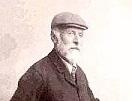1605 - 1681 Person Name: E. C. Homburg Topics: The Church Year Ascension; The Church Year Ascension Author of "O wondrous Conqueror and great" in The Lutheran Hymnary Ernst C. Homburg (b. Mihla, near Eisenach, Germany, 1605; d. Naumberg, Germany, 1681) wrote most of his hymns for his own devotions. He described this eight-stanza text as a "hymn of thanksgiving to his Redeemer and Savior for his bitter sufferings." In early life, Homburg was a writer of love and drinking songs. After a difficult time of family illness he experienced a religious conversion, and his poetry took a more serious turn. A lawyer by profession, he wrote hymns to express and strengthen his own faith rather than for public use. Some 150 of his hymn texts were published in his Geistliche Lieder.
Bert Polman
======================
Homburg, Ernst Christoph, was born in 1605, at Mihla, near Eisenach. He practised at Nauraburg, in Saxony, as Clerk of the Assizes and Counsellor. In 1648 ho was admitted a member of the Fruitbearing Society, and afterwards became a member of the Elbe Swan Order founded by Rist in 1660. He died at Naumburg, Juno 2, 1681. (Koch, iii. 388, 392; Allegemeine Deutsche Biographie, xiii. 43, 44.)
By his contemporaries Homburg was regarded as a poet of the first rank. His earlier poems, 1638-1653, were secular, including many love and drinking songs. Domestic troubles arising from the illnesses of himself and of his wife, and other afflictions, led him to seek the Lord, and the deliverances he experienced from pestilence and from violence led him to place all his confidence on God. The collected edition of his hymns appeared in two parts at Jena and Naumburg, 1659, pt. i. as his Geistlicher Lieder, Erster Theil, with 100 hymns [engraved title, Naumburg, 1658]; and pt. ii. as the Ander Theil with 50 hymns. In the preface he speaks of them as his "Sunday labours," and says, "I was specially induced and compelled" to their composition" by the anxious and sore domestic afflictions by which God.....has for some time laid me aside." They are distinguished for simplicity, firm faith, and liveliness, but often lack poetic vigour and are too sombre.
Two of his hymns have passed into English, viz.:—
i. Ach wundergrosser Sieges-Held. Ascension. 1659, pt. i. p. 400, in 6 stanzas of 11 lines, entitled, "On the Ascension of Jesus Christ." In the Berlin Geistliche Lieder, ed. 1863, No. 327.
The translations are: (l) “O wondrous Conqueror and Great," by Miss Burlingham, in the British Herald, Oct. 1865, p. 153, and Reid's Praise Book, 1872, No. 445. (2) "O glorious Saviour, conquering King," by N. L. Frothingham, 1870, p. 272.
ii. Jesu meines Lebens Leben. Passiontide. 1659, pt. i. p. 318, in 8 stanzas of 8 lines, entitled, "Hymn of Thanksgiving to his Redeemer and Saviour for His bitter Sufferings." This is his most popular hymn, and has passed into many recent collections, including the Berlin Geistliche Lieder, ed. 1863. Translated as:—
1. Jesu! life! the life of heaven. Translation of stanzas i., ii., vi.-viii., by A. T. Russell, for his Psalms & Hymns, 1851, No. 88.
2. Of my life the Life, 0 Jesus. A good translation of stanzas i., ii., v., vii., viii., contributed by R. Massie to the 1857 edition of Mercer's The Church Psalter & Hymnbook, No. 404 (Ox. ed. 1864, No. 185), repeated in the Methodist New Connexion Hymn Book, 1863.
3. Christ the life of all the living. A good translation of stanzas i., ii., v., vii., viii., by Miss Winkworth, in her Chorale Book for England, 1863, No. 49. Repeated in full in Dr. Thomas's Augustine Hymn Book, 1866, and the Ohio Lutheran Hymnal 1880; and abridged in the Pennsylvania Lutheran Ch. Book., 1868, the Hymnary , 1872, and others.
4. Thou eternal life bestowest. Translations of stanzas i.-iii., viii., by Miss Borthwick, contributed to Dr. Pagenstecher's Collection, 1864, No. 73, and repeated in Hymns from the Land of Luther, ed. 1884, p. 257.
Other translations are: (1) "Jesu, Source of my Salvation," by J. C. Jacobi, 1732, p. 29, repeated in the Moravian Hymn Book, 1754 (1886, No. 97). (2) "Jesus! Source of life eternal," by Miss Burlingham, in the British Herald, Aug. 1865, p. 120, and Reid's Praise Book, 1872, No. 389. (3) "Jesus, of my life the living," by N. L. Frothingham, 1870, p. 198.
[Rev. James Mearns, M.A.]
--John Julian, Dictionary of Hymnology (1907)
Ernst Christoph Homburg
